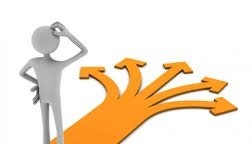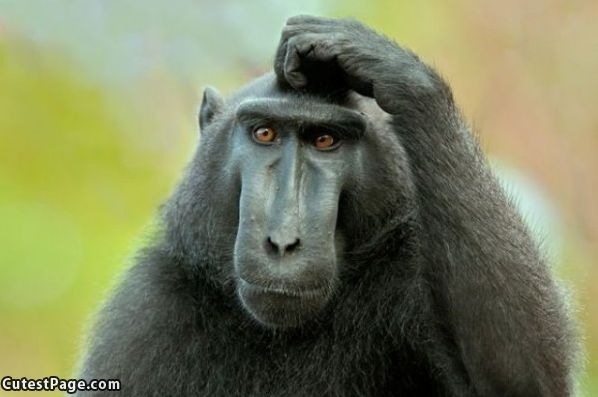How to make a bad decision.

It started with a humour book (or humor book for those who don't spell correctly).
I've recently discovered A.J.Jacobs' new book - The Guinea Pig Diaries - My Life as an Experiment . In the book, the author performs some absolutely inane experiments on himself, and then writes about it.
Let me provide an excerpt from Amazon's description:
"In the Guinea Pig Diaries, Jacobs goes undercover as a beautiful woman. He outsources everything in his life to India, from answering his emails to arguing with his wife. He spends two months saying whatever is on his mind. He lives like George Washington. Plus several other life-changing experiments—one of which involves public nudity."
Now tell me honestly you aren't intrigued.
This man had me laughing out loud several times - until near the end of the book - where he got my brain spinning around the concept of cognitive biases.
According to Wikipedia, (the website we don't allow our students to reference):
"A cognitive bias describes a replicable pattern in perceptual distortion, inaccurate judgment, illogical interpretation, or what is broadly called irrationality. They are the result of distortions in the human mind that always lead to the same pattern of poor judgment, often triggered by a particular situation."
I then scanned the long list of biases in the article and realized that I've applied a few of them over the years. I've even written about one of them in my post: Why Smart People (You) do Dumb Things.
It became very apparent that every leader should be aware that these biases can (and likely do) affect their decision making. Being forewarned is forearmed, and as such let me present a few of your new enemies.
I've copied a section of the Wikipedia article below about the cognitive biases that affect social interaction. The links are active to the related articles. The full article on Cognitive Bias is available here.
- Actor-observer bias – the tendency for explanations of other individuals' behaviors to overemphasize the influence of their personality and underemphasize the influence of their situation (see also Fundamental attribution error), and for explanations of one's own behaviors to do the opposite (that is, to overemphasize the influence of our situation and underemphasize the influence of our own personality).
- Defensive attribution hypothesis – defensive attributions are made when individuals witness or learn of a mishap happening to another person. In these situations, attributions of responsibility to the victim or harm-doer for the mishap will depend upon the severity of the outcomes of the mishap and the level of personal and situational similarity between the individual and victim. More responsibility will be attributed to the harm-doer as the outcome becomes more severe, and as personal or situational similarity decreases.
- Dunning–Kruger effect an effect in which incompetent people fail to realise they are incompetent because they lack the skill to distinguish between competence and incompetence
- Egocentric bias – occurs when people claim more responsibility for themselves for the results of a joint action than an outside observer would.
- Extrinsic incentives bias – an exception to the fundamental attribution error , when people view others as having (situational) extrinsic motivations and (dispositional) intrinsic motivations for oneself
- Forer effect (aka Barnum effect) – the tendency to give high accuracy ratings to descriptions of their personality that supposedly are tailored specifically for them, but are in fact vague and general enough to apply to a wide range of people. For example, horoscopes.
- False consensus effect – the tendency for people to overestimate the degree to which others agree with them.
- Fundamental attribution error – the tendency for people to over-emphasize personality-based explanations for behaviors observed in others while under-emphasizing the role and power of situational influences on the same behavior (see also actor-observer bias, group attribution error, positivity effect, and negativity effect).
- Halo effect – the tendency for a person's positive or negative traits to "spill over" from one area of their personality to another in others' perceptions of them (see alsophysical attractiveness stereotype).
- Illusion of asymmetric insight – people perceive their knowledge of their peers to surpass their peers' knowledge of them.
- Illusion of external agency – when people view self-generated preferences as instead being caused by insightful, effective and benevolent agents
- Illusion of transparency – people overestimate others' ability to know them, and they also overestimate their ability to know others.
- Illusory superiority – overestimating one's desirable qualities, and underestimating undesirable qualities, relative to other people. (Also known as "Lake Wobegon effect," "better-than-average effect," or "superiority bias").
- Ingroup bias – the tendency for people to give preferential treatment to others they perceive to be members of their own groups.
- Just-world phenomenon – the tendency for people to believe that the world is just and therefore people "get what they deserve."
- Moral luck – the tendency for people to ascribe greater or lesser moral standing based on the outcome of an event rather than the intention
- Naive cynicism – expecting more egocentric bias in other than in oneself
- Outgroup homogeneity bias – individuals see members of their own group as being relatively more varied than members of other groups.
- Projection bias – the tendency to unconsciously assume that others (or one's future selves) share one's current emotional states, thoughts and values.
- Self-serving bias – the tendency to claim more responsibility for successes than failures. It may also manifest itself as a tendency for people to evaluate ambiguous information in a way beneficial to their interests (see also group-serving bias).
- System justification – the tendency to defend and bolster the status quo. Existing social, economic, and political arrangements tend to be preferred, and alternatives disparaged sometimes even at the expense of individual and collective self-interest. (See also status quo bias.)
- Trait ascription bias – the tendency for people to view themselves as relatively variable in terms of personality, behavior, and mood while viewing others as much more predictable.
- Ultimate attribution error – similar to the fundamental attribution error, in this error a person is likely to make an internal attribution to an entire group instead of the individuals within the group.
- Worse-than-average effect – a tendency to believe ourselves to be worse than others at tasks which are difficult
Take your time.
Have you shown any of these biases?
As for me, I've just located my check list for this year's personal development plan. To evaluate my leadership and see how I can grow in this area.
As for the book? I highly recommend you get a copy.
You'll need a good laugh after all this personal reflection. Both of which are good for you.
_________________________________________________________________
Image: MS Office Imagebank
This post has been previously published on LinkedIn
About the Author:

I'm convinced that IT leadership needs to dramatically change how IT is delivered rather than being relegated to a costly overhead department.
In addition to transforming IT in my role as CIO, I look for every opportunity to talk about this... writing, speaking and now blogging on BeBee (https://www.bebee.com/@kevin-pashuk) , LinkedIn, ITWorld Canada, or at TurningTechInvisible.com.
I also shoot things... with my camera. Check out my photostream at www.flickr.com/photos/kwpashuk
Articles from Kevin Pashuk
View blog
My father passed on recently. · He celebrated his 90th birthday this summer, and had recently moved ...

What's the difference between an "Older" worker and a "Vintage" worker? To some, they both appear to ...

I was searching for some old files on a backup drive, and came across this collection of things that ...
Related professionals
You may be interested in these jobs
-
concrete finisher
Found in: Talent CA 2 C2 - 4 days ago
Apex Concrete Finishing Ltd Coleman, CanadaEducation: No degree, certificate or diploma · Experience: 2 years to less than 3 years · Screening questions · Are you currently legally able to work in Canada? · Do you have previous experience in this field of employment? · Workplace information · On the road job · Health bene ...
-
technical sales specialist
Found in: Talent CA 2 C2 - 17 hours ago
WestGen Abbotsford, CanadaDurée de l'emploi: Permanent · Langue de travail: Anglais · Heures de travail: 40 hours per week · Education: · Expérience: · Education · Bachelor's degree · Work site environment · Livestock · Tasks · Promote sales to existing clients · Identify and solicit potential clients · ...
-
office administrative assistant
Found in: Talent CA 2 C2 - 1 week ago
Triple S Aggregates Ltd. Abbotsford, CanadaEducation: · Expérience: · Education · Secondary (high) school graduation certificate · Tasks · Schedule and confirm appointments · Answer telephone and relay telephone calls and messages · Order office supplies and maintain inventory · Greet people and direct them to contacts ...




Comments
Kevin Pashuk
7 years ago #12
Thanks Donna-Luisa Eversley. I know you will enjoy A.J. Jacob's book. He can make the most boring topic incredibly readable through humour.
Kevin Pashuk
7 years ago #11
I look forward to your comments Joanna Hofman once you've had a chance to grab a (big) coffee and read the whole thing.
Susan 🐝 Rooks, The Grammar Goddess
7 years ago #10
Now that is funny, Randy Keho!
Kevin Pashuk
7 years ago #9
If you read this chapter in the book Dean Owen, you will see that it was amazingly effective, at least for one half of the couple...
Dean Owen
7 years ago #8
Kevin Pashuk
7 years ago #7
Good suggestion Randy Keho. I just checked, and my stock of female impersonator photos is really low right now.
Randy Keho
7 years ago #6
Kevin Pashuk
7 years ago #5
Followed through... unlike my golf swing. Thanks for reminding me Michael Hillebrand
Susan 🐝 Rooks, The Grammar Goddess
7 years ago #4
I don't like long posts myself, Kevin Pashuk, but your first sentence at least made it possible to keep reading for a bit. And while it's long, it's also interesting.
Kevin Pashuk
7 years ago #3
Thanks Susan Rooks. While it seems daunting, the process of self reflection has been most useful. I am afraid however (because I have a tendency to skip longer posts) that many will put this in the TLDR* file. * Too Long, Didn't Read
Susan 🐝 Rooks, The Grammar Goddess
7 years ago #2
Kevin Pashuk
7 years ago #1